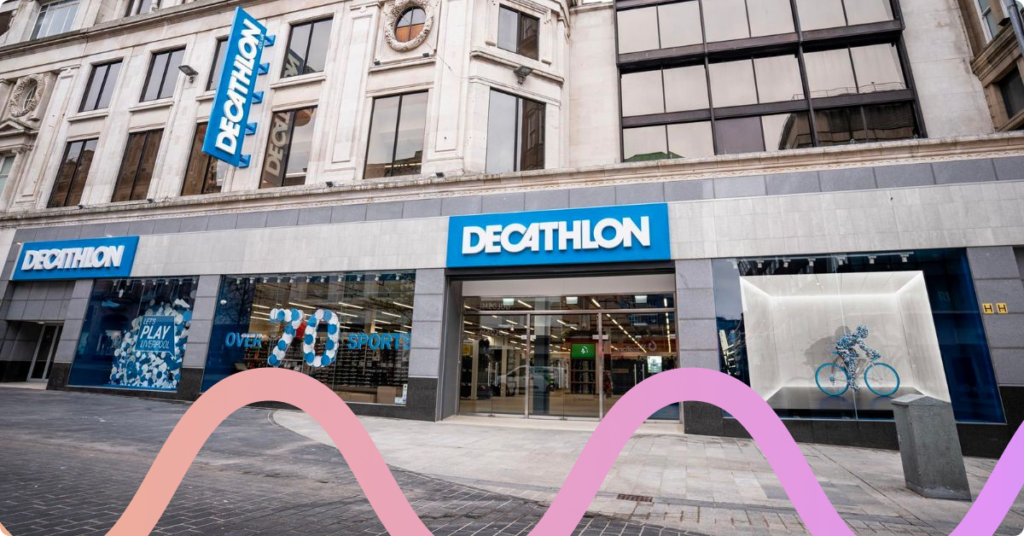Decathlon, a renowned sports retailer based in France, has made great strides in the Indian market since it was established in Bangalore in 2009. In the last decade, it has opened over seventy warehouse-style stores and expanded its presence to cover all major metropolitan areas. This article provides a detailed analysis of the varied approaches, unique qualities, and market forces that have contributed to the success story of Decathlon in India’s sports retail industry. Uncover the strategic initiatives and community-focused approach that have propelled the success story of Decathlon in India’s competitive sports retail sector.
From Bangalore to Nationwide Dominance: The Inspiring Success Story of Decathlon in India
Financial Success and Market Position
It’s no surprise that Decathlon has achieved remarkable financial success in India. The company hit a significant milestone in its growth trajectory with a fiscal year ending in March 2018, where it earned revenue of Rs 1,278 crore. Moreover, following Xiaomi, Decathlon has become the second-largest single-brand retailer in India, showcasing its strong market position and customer appeal.
While no financial data is available beyond 2018, it’s important to note that Decathlon’s online sales have likely seen substantial growth, especially with the increased focus on health and fitness during the COVID-19 pandemic. However, like many physical retailers, Decathlon’s in-person visits may have faced challenges during closure periods and limited mobility.
Store Design and Layout
Decathlon’s store layout and design philosophy are critical to the company’s success strategy. Unlike conventional retailers, Decathlon opts for expansive “playground” style locations over 4000 square metres instead of consolidating physical stores. These large-format stores are intentionally situated on the outskirts of urban areas or in less frequented shopping centres for cost-effectiveness and customer accessibility.
Once inside, patrons are welcomed by a “grid” arrangement that classifies aisles based on sports or activities, allowing them to navigate the store quickly. This design also creates a cohesive and engaging retail experience that promotes practical engagement with merchandise, fostering a deeper connection between customers and the organisation.
Decathlon’s store design prioritises functionality and simplicity. Minimalist lighting highlights the products’ true colours without unnecessary distractions such as loud music or overpowering fragrances. Low storage facilitates product accessibility, making the shopping experience enjoyable and interactive for customers.
Pricing Strategy and Cost Efficiency
Decathlon’s competitive pricing strategy has been a significant factor in acquiring and retaining consumers in the Indian market. The brand’s products are priced approximately 30-40% lower than its competitors, making them accessible to a broad range of consumers across different income brackets. Due to this combination of affordability, superb quality, and a diverse product selection, Decathlon has established itself as the preferred option among individuals passionate about sports.
Behind Decathlon’s competitive pricing lies a robust framework of cost-efficient initiatives
Robust Research and Development: The organisation invests significantly in research and development (R&D) and employs a committed team of 700 specialists who consistently strive to improve and innovate product designs. They file up to forty patent applications annually, showcasing their dedication to technological progress and unique product offerings.
Integrated Design and Manufacturing: Decathlon’s integrated approach to design and manufacturing facilitates cost savings and streamlines operations while maintaining high-quality standards. The brand optimises supply chain logistics, materials, and production processes to minimise expenses.
Efficient Supply Chain Management: The brand’s effective supply chain management is crucial to cost optimisation. Decathlon guarantees timely product delivery while reducing operational expenses by establishing and maintaining enduring alliances with reputable manufacturers and suppliers.
Private Label Domination: Decathlon has a portfolio of private labels spanning over seventy sports categories, giving it a pricing and brand management advantage. The brand controls pricing determinations and product quality through comprehensive supply chain management, from design to distribution.
Engagement and Community Building
Decathlon’s success is built on three strategic pillars: community involvement, customer-centric initiatives, and brand allegiance. Their stores are designed to be more than just traditional retail locations. They serve as centres for customers to engage in physical activities, test products, and participate in community events, sports seminars, and fitness workshops. This experiential approach promotes recurrent visits and enhances customer satisfaction.
Decathlon’s sales associates are passionate sports fans who have received specialised training to offer individualised recommendations and direction to patrons. Their extensive knowledge in the field and authentic passion for sports enhance the purchasing experience and foster a sense of connection with patrons.
Through its community involvement and sports advocacy, Decathlon has established itself as an advocate for active lifestyles and inclusive sports. These endeavours nurture camaraderie and a sense of belonging among its clientele, further increasing customer visits and enhancing Decathlon’s reputation.
Engagement and Community Building
Decathlon’s success is built on three strategic pillars: community involvement, customer-centric initiatives, and brand allegiance.
Experiential Retail: Decathlon stores function as centres for experiences rather than just being retail locations. Customers can engage in physical activities and test products in trial areas, interactive zones, and indoor sports facilities. This experiential strategy promotes recurrent visits and increases customer satisfaction.
Knowledgeable Staff: Sales associates at Decathlon are passionate sports fans who have received specialised training to offer individualised recommendations and direction to patrons. Their authentic passion for sports and extensive knowledge in the field enhance the purchasing experience and foster a sense of connection with patrons.
Community Programs and Events: The establishment coordinates community events, sports seminars, and fitness workshops within its retail locations, nurturing camaraderie and belonging among its clientele. These endeavours increase customer visits and enhance Decathlon’s reputation as an advocate for active lifestyles and inclusive sports.
Innovations and Technology Integration
Decathlon is dedicated to integrating technology and innovation into all aspects of its business, including retail operations, product development, and customer engagement.
Digital Transformation: The brand has invested in digital transformation strategies such as multichannel experiences, mobile applications, and e-commerce platforms to enhance its physical stores and provide consumers with seamless purchasing options and convenience.
Product Innovation: Decathlon offers diverse products, from cutting-edge apparel designs to sophisticated athletic equipment, showcasing its commitment to product innovation. The brand co-creates products with athletes, experts, and consumers to align with the ever-changing market demands and performance standards.
Smart Retail Solutions: Decathlon utilises technology-driven solutions like intelligent register systems, inventory management software, and data analytics to increase overall efficiency, optimise retail operations and gain deeper customer insights.
Local Adaptation and Global Expertise
Decathlon’s success in India can be attributed to its ability to balance global expertise and local adaptation. The brand is aware of the complexities of the Indian market and tailors its products and services accordingly while leveraging its worldwide resources, industry expertise, and best practices to foster innovation.
Localised Product Offerings: Decathlon recognises the different sporting preferences and cultural nuances across India’s regions. The brand offers customised solutions, seasonal collections, and localised product variants to meet the diverse market demands. For example, there may be differences in the availability of water sports products in inland regions like Delhi and coastal areas like Goa.
Regional Marketing Strategies: The company also employs region-specific marketing strategies to connect with local audiences effectively. These strategies include partnering with local sports organisations or associations, sponsoring regional sporting events, and launching targeted advertising campaigns. These initiatives promote community involvement, foster brand loyalty, and increase brand visibility.
Cultural Sensitivity: Decathlon values cultural sensitivity and inclusivity in its product representations, messaging, and branding. The brand advocates for athletics as a unifying influence that transcends cultural boundaries and celebrates diversity. This inclusive approach resonates with Indian consumers and enhances Decathlon’s positive brand image.
Social Impact and Sustainability
Decathlon places great importance on social impact and sustainability initiatives alongside profitability, catering to the growing consumer demand for ethical conduct and environmental responsibility.
Ethical Sourcing and Manufacturing: The brand prioritises ethical material procurement, equitable labour practices, and sustainable manufacturing processes. Decathlon adheres to global standards for responsible production and collaborates with certified suppliers to reduce its environmental impact and promote social welfare.
Community Outreach: Decathlon participates in various educational and community outreach programs and grassroots sports development projects. These initiatives encourage disadvantaged communities to engage in sports, empower young people through sports education, and promote inclusivity and accessibility.
Environmental Conservation: Furthermore, Decathlon incorporates environmentally sustainable practices into its business operations, such as recycling, energy conservation, and waste reduction. The brand also promotes eco-friendly products, advocates for sustainable sports practices, and invests in environmental conservation initiatives to minimise its ecological footprint.
Challenges and Opportunities (Behind the Success Story of Decathlon)
Decathlon has achieved notable success in the Indian sports retail industry but still faces specific challenges and opportunities.
Competition from Global and Local Players: One of Decathlon’s biggest challenges is competing with well-established international brands like Nike, Adidas, and Puma, as well as local competitors that offer a wide variety of products at competitive prices. To maintain its market leadership, Decathlon must innovate, differentiate itself from the competition, and provide exceptional customer value.
E-commerce Disruption: The rise of e-commerce platforms is both an opportunity and a challenge for Decathlon. While online sales offer scalability and accessibility, they also increase competition, pricing risks, and logistical complexities. To succeed in the digital environment, Decathlon must use omnichannel strategies and digital advancements to enhance the customer experience effectively.
Market Expansion and Segmentation: Expanding into tier-2 and tier-3 urban areas presents Decathlon with opportunities for growth and increased market share. However, the brand must use region-specific approaches and understand local dynamics to penetrate these emerging markets effectively. Providing segment-specific offerings, pricing strategies, and marketing campaigns can generate favourable results across different market segments.
Future Outlook and Strategic Imperatives
Decathlon’s future success is contingent on several strategic imperatives and vital focal areas:
Innovation and Product Differentiation: Decathlon must allocate resources to research and development, product innovation, and technological progress to stand out from its competitors. This will help the company elevate the standard of its products, distinguish its merchandise, and align with consumers’ ever-changing demands.
Customer-Centricity: To build customer loyalty, advocacy, and recurrent business, Decathlon should uphold a customer-centric approach. This can be achieved by delivering exceptional service and providing personal experiences. Data analytics, customer feedback, and market insights should be used strategically to optimise customer satisfaction and adapt the company’s offerings.
Sustainability and Social Responsibility: Fortifying sustainability initiatives, social impact programs, and environmental stewardship is another crucial aspect that will help Decathlon bolster its brand reputation. It will appeal to consumers prioritising social responsibility and fostering long-term value generation.
Digital Transformation: Digital transformation, e-commerce optimisation, and omnichannel integration are three strategic moves that can enhance operational efficiency, broaden market penetration, and leverage digital trends and consumer preferences.
Partnerships and Collaborations: Decathlon aims to increase its brand visibility, encourage community participation, and generate mutual value by establishing strategic alliances and collaborating with academic institutions, community organisations, and sports federations.
Conclusion
The success story of Decathlon in the Indian sports retail industry can be attributed to its astuteness in strategy, dedication to customer satisfaction, capacity for innovation, and social responsibility. Decathlon is well-positioned to achieve long-term expansion, market dominance, and a beneficial influence on society within the ever-evolving Indian retail industry through strategically managing obstacles, exploiting favourable circumstances, and adhering to its fundamental principles. Explore the success story of Decathlon in becoming a dominant player in India’s sports retail market, driven by a blend of competitive pricing, engaging store experiences, and robust community engagement.




